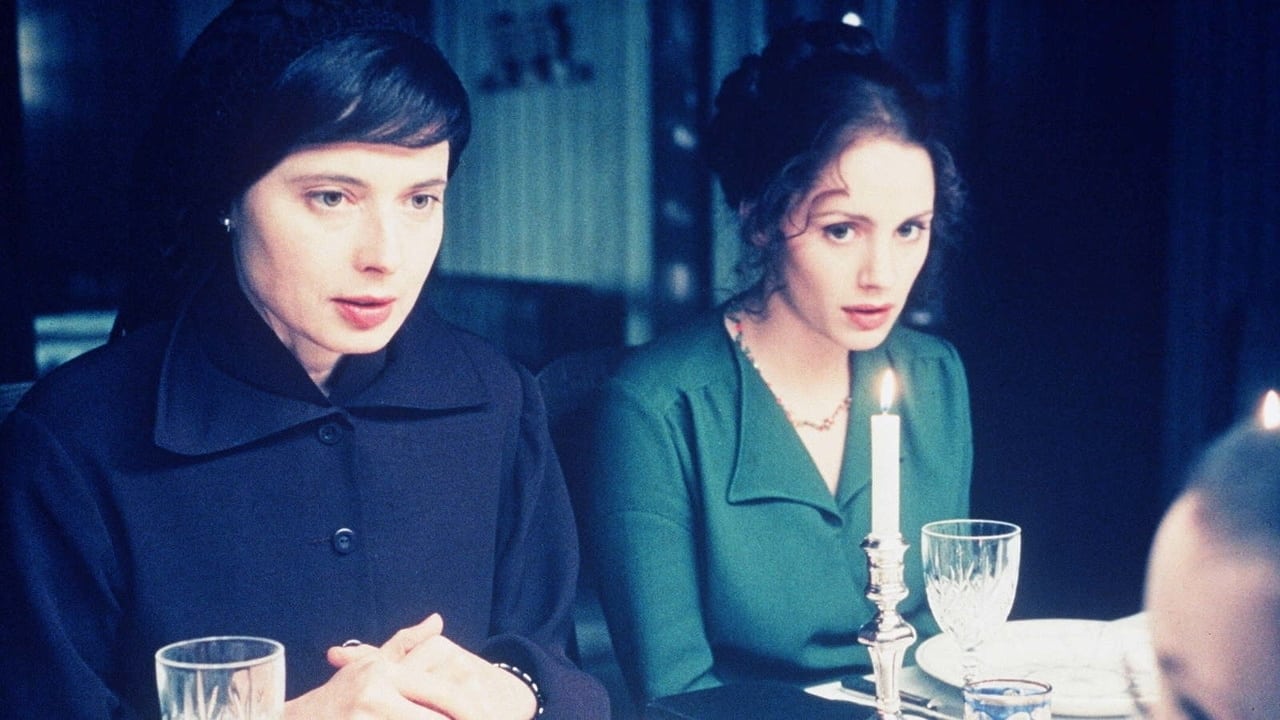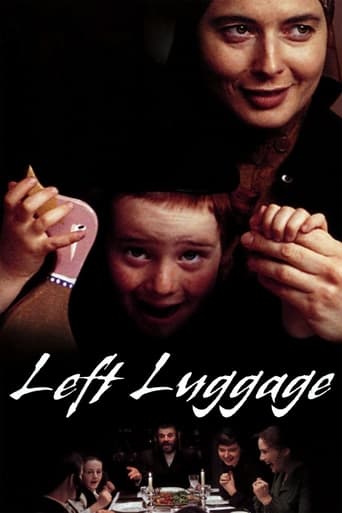


The movie starts with a father telling his young daughter Chaya the story of how he had to escape from the Germans carrying everything he had in only two suitcases. Eventually, he had to bury the suitcases because he couldn't carry them any more as he kept running from place to place.The loud rock music and the protests reminiscent of 1960s America tell us times have changed. And despite the somber opening, the movie takes a comic turn rather quickly, though it is far from a comedy.In 1972 Antwerp, Chaya is a sweet, pretty 20-year-old philosophy student who does have a temper when riled. She quits her latest job at a restaurant after a prank (if you don't care for 'Fear Factor' and you have the ability to fast-forward, use it here).Chaya visits her parents and finds out her father has still not given up on finding his suitcases. He has a map, but the area has changed so much. She is getting tired of hearing the story. Meanwhile, her kindly mother continues baking cakes. We also find out later she is making waterproof blankets with a loom.With her landlady frustrated about all the delays with receiving rent money, Chaya must find a job soon. Mr. Apfelschnitt knows of a job as a nanny with a Hasidic family, the Kalmans. Chaya, despite being Jewish by birth, claims to hate Jews (though she is good friends with Mr. Apfelschnitt, who wears a yarmulke). But her desperation leads her to try.Hasidic Jews are like the Amish and the Mennonites in Christianity--very strict, shunning many modern conveniences. And the minute she arrives at the third-floor apartment, Mrs. Kalman starts explaining those rules. Her husband's bedroom is off-limits, for example. And Chaya should dress like a woman; she is wearing jeans. Among the family's five children is Simcha, who is four but has never talked, but he and Chaya immediately make a connection.The rules become too much for Chaya and she quits, but she accidentally takes something with her that belongs to the Kalmans, and she must return it. When she sees Simcha again, she knows she can't leave.Chaya must work through the difficulties of life in the Hasidic culture, among other problems. One of her obstacles is the evil concierge, who constantly claims the elevator is out of order. In fact, he hates Jews with a passion and doesn't want them to ride it. He calls them lazy, ranting about how HE has to work. His only friend seems to be his dog. The concierge's evil behavior provides the film with many of its comic moments.Eventually, Chaya makes a breakthrough with Simcha, as Annie Sullivan did. But her modern attitude is out of place here, and her desire to see people treated with respect is not appreciated. Also, she is called a 'Gomer' (meaning harlot, though a stronger word was used) when she finally dresses like a woman. In 1972, a lot of women wore scandalously short skirts.A tragedy threatens to keep this movie from having a happy ending. The event does offer more insights into Hasidic culture, though, and leads to some good acting and writing. The last scene with dialogue is a happy and even humorous one, though, but this is followed by depressing music and scenery that reminds us of change.If this movie had been done in the language of the people depicted, I believe it would have been worthy of a foreign-language Oscar. Being in English, it probably had too much competition that was better-known. But Laura Fraser did a fine job as Chaya. She showed such charm and such determination, and effectively showed us many emotions.Adam Monty made an immediate impression as the young Simcha, giving a winning performance even without saying a word, and still impressing once he talked. The movie's best scenes were those with him and Chaya.Topol also did a fine job as Mr. Apfelschnitt. Everyone in a leading role gave a good performance--Maximilian Schell as Chaya's father, Isabella Rossellini as the Hasidic mother particularly. I will also single out Jeroen Krabbe as the Hasidic father, who could be loving and even happy despite his often strict and often angry demeanor. But his best moment came as he described what happened to his family during World War II.I also must mention David Bradley as the concierge, who actually showed a human side.Was this a family movie? Perhaps. There were a few dirty words, and references to the promiscuity of Chaya's roommate, but maybe this was not any worse than two episodes of '7th Heaven'. There was also a skinny-dipping scene with Chaya and her roommate, but we didn't really get to see anything (unless this was edited for TV).There are references to the Holocaust, and one really scary moment with the concierge, though it is followed by the funniest moment in the movie.The educational value of the film may outweigh other considerations. We learn a lot more about the Hasidic than I ever knew, and as depicted here, they are not the uptight people some believe them to be, despite all their rules.This was an outstanding effort.
... View MoreThis is a fine example of an excellent Dutch/Belgian co-production which can easily compete with any international successful drama-film. Jeroen Krabbé did a superb job with his directional debut. He himself, as an actor, doesn't have much screen time and gave Isabella Rossellini and especially Laura Fraser the opportunity to really shine in this movie.Laura Fraser plays Chaya, a progressive philosophy student of Jewish origin who lives on her own. She regularly visits her parents but doesn't have a lot in common with them anymore. She takes on a job as a nanny for a very conservative Chassidic family. From the start there are many conflicts, especially with the rigorous father (Jeroen Krabbé), but soon the youngest son, the silent Chimsa, wins her love. All this takes place in Antwerp during the 70's, and in the meantime, a subplot involving Chaya's father's search for two suitcases (lost during the war) develops.It simply is a beautiful story, about a lot of things in fact. The clash between tradition and progression. The questioning of Jewish values. Trying to come to terms with the past (the war, the lost luggage,...). Family tragedies. Those different aspects of the plot blend with each other perfectly. The movie takes its time to tell the story, but it's never too slow.Laura Fraser gives a wonderful performance. She's so enjoyable when she shows she's got spirit, dares to question harsh authority and tries to do what's right for everyone. Did I mention she's beautiful too? And, as opposed to some other viewers, I think the nude swimming-scene was very appropriate as it illustrates the protagonist's progressive state of mind. It's not gratuitous, it's not provoking. It's natural.Jeroen Krabbé's directing is pretty magnificent. Though it's 'just' a drama-movie, there are a few amazing shots to admire: One tracking shot which starts at a window on the top floor of the building, going down several floors and showing our protagonist leaving the building at ground zero. A nice scene at the docks. Beautiful sepia-colored shots in the prologue. An impressive crane-shot at the end.But there are a few minor aspects too. I thought the pathos was a bit too heavy in the slow-motion shot of little Simcha running with the ducks. And the fact that nobody acted against the harassing concierge bugged me a bit too. And Chaya climbing out of the building in order to leave the building was perhaps a bit far-fetched too.But it is one fine movie with a touching story and honest acting performances (though, I think comparing it to Spielberg's SCHINDLER'S LIST is totally misplaced and giving it a little too much credit). But it did encourage me to see more movies starring Laura Fraser and wanting to see Krabbé's THE DISCOVERY OF HEAVEN (which was based on a Harry Mulisch novel).
... View MoreThis is a brilliant film, astonishing, really. Laura Fraser is the most talented young actress in cinema today. She is simply fabulous as the start of "Left Luggage."Stories about Hasidic Jews have made been made into several excellent films: "The Chosen" -- coincidentally also starring Maximilian Schell -- and "A Stranger Among Us" come immediately to mind. "Left Luggage" is by far the best.
... View MoreChassidim wear dark clothing and follow strict religious rules. Therefore, many people tend to think of them as dour, repressive, and joyless. Nothing could be further from the truth. Actually, Chassidism stresses joy, music, and a passion for life. All of this is absent from the movie.It is a shame that the people making this movie had no actual knowledge of Chassidic society. Or -- if they did -- that they chose to ignore it. They shamelessly play to the negative stereotypes, presenting a psychologically abusive father in a repressive society. Oh -- the movie is well done and well acted, but it is so distorted in its portrayal of Chassidic subculture that it comes out to be offensive.
... View More